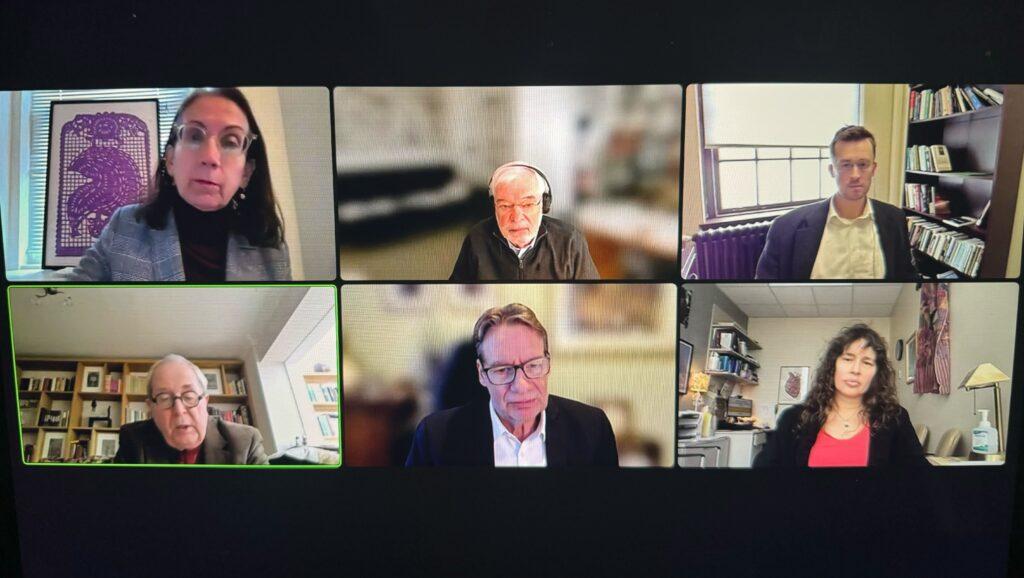The Free Speech Project and the Future of the Humanities Project co-hosted a virtual panel discussion about the international refugee crisis on Jan 24.
The event was part of the two organizations’ Free Speech at the Crossroads: International Dialogues series, which discussed the international misconceptions of the refugee crisis and potential solutions. Michael Scott, the senior dean of Oxford University and fellow of Blackfriars Hall, and Sanford J. Ungar, the president emeritus of Goucher College and director of the Free Speech Project, moderated the panel.
The Future of the Humanities Project unites scholars at Georgetown University and Oxford University to consider and discuss issues in humanities and public life. The Free Speech Project is an initiative at Georgetown to track and analyze threats to free speech in America.
The four panelists in this event included Katharine Donato, a professor of international migration in the Georgetown University School of Foreign Service (SFS) and the former director of the Institute for the Study of International Migration; Rachel Kronick, a clinician-scientist and assistant professor in psychiatry at McGill University in Canada; Michael Saks, appointed member of the World Health Organization Technical Expert Group on Global Health Practitioner Regulation and the chair of the Institute for Responsible Leadership, a United Nations endorsed organization that aims to promote corporate responsibility; and Barnabas Aspray, an assistant professor at St. Mary’s Seminary & University in the United Kingdom.

Donato said the number of refugees and asylum seekers is currently at a global all-time high.
“We seem to, at least in the last decade to two decades, be in a situation where more and more people are experiencing at minimum generalized violence and conditions related to violence that threaten them,” Donato said at the event.
“The situation couldn’t be more dire for as many people as we’re looking at now,” Donato added.
According to the United Nations High Commissioner for Refugees, 110 million people are forcibly displaced across the world, and 75% of these people are hosted in low- and middle-income countries.
Kronick said the distress that occurs alongside refugee arrivals can be reduced with hospitable and welcoming reception policies.
“Unfortunately, we tend to discursively frame refugees, asylum seekers and forcibly displaced people as the crisis themselves and potential burdens on our economies and school systems, et cetera,” Kronick said. “I think we need to work on reframing.”
Aspray said many current politicians weaponize citizens’ fear of economic instability and scarcity to frame the refugee crisis as a threat to their well-being.
“Fear is part of what drives this whole discussion at the moment,” Aspray said. “It’s a very powerful political tool that governments can use to get themselves reelected. And they want to scapegoat somebody who can’t vote.”
This negative portrayal of immigration and the refugee crisis is an important factor in the 2024 U.S. presidential election this November, where immigration is a main issue for primary-voting Republicans across the nation. Other countries such as the United Kingdom also have important elections in 2024 that will dictate future policy on refugee aid.
Aspray said that the fear of immigrants harming a country’s economy is a misconception.
“If you talk to any economists, they know that immigration is always good for the economy in the long run,” Aspray said. “It may, in the first couple of years, cause a deficit, but in the long run, it’s always good for the economy. But that message hasn’t really gotten through to the voting public because of this huge amount of fear, which is being capitalized on by the governments in place.”
Immigrants contribute positively to the U. S. economy, including expanding the labor force and spending incomes on American goods and services, according to the Center on Budget and Policy Priorities, a nonpartisan research institute that focuses on resource equity.
Saks said that asylum seekers should be treated with respect as they wait from six months to years while their asylum claims are being processed, as they cannot draw on welfare benefits and are not allowed to work during this time period, putting them in a precarious situation.
“I think that we really do need some radical change,” Saks said. “And we need to treat everyone with due respect as a refugee and be very sensitive to some of the terrible consequences that they’re facing, in terms of schooling, in terms of poverty, in terms of other issues, particularly in the position where they’re waiting for long periods or asylum claims to be heard.”
Aspray said he considers whether moral responsibility — including perceptions of a wider human obligation to help all in need — encompass something greater than solely individual or family-based caretaking.
“I think from a religious point of view, there’s a lot of support for the idea that we’re all in this together. We’re all a common humanity, real brothers and sisters together,” Aspray said. “And we all stand or fall together.”




















